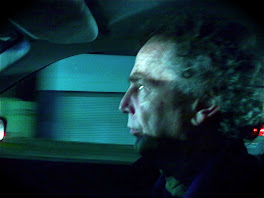Thursday, May 05, 2005
mighty dread
I never go out to drive without a sense of dread, even impending catastrophe. Why is this? Nothing bad has happened to me yet and I trust will not. No, it is more psychological, some deep conflict between how I would like to imagine myself existing in the world and how, incontrovertibly, I do. And yet the feeling soon passes, I settle into the rhythm of the shift, the rhythm, let it be said, of the pursuit of money. Plus the ancillary social research I cannot help following. Every fare is a question or a conundrum. Who are they? Where are they going? Why? I am always trying to find out as much as I can about the Other(s) in these relatively brief commercial transactions. Because I work through the evening rush hour and also because I pick up most of my fares in the City, I get a lot of business people in the cab. Most of them do not interact with me in any meaningful way. Mostly they use the travelling time to catch up with calls on their mobiles. Or, if there is more than one of them and they are colleagues, they discuss work matters between themselves. The language of business is at once highly metaphorical and deadly dull. Phrases recur ... 'up to the next level' (architecture?); 'driving the process' (transport?); 'put our beefs on the table' (culinary?); and so on. What is perhaps interesting is that this language is almost entirely uninflected by whatever line of business is being pursued. In fact it is sometimes difficult to discover the line of business at all. Whether it is sports promotion, health care products, banking, travel ... does not matter much insofar as the language itself is concerned. The universal subtext, largely assumed, almost never explicitly discussed, is the acquisition of wealth by means of struggle. 'Teams' use 'strategies' to 'get a win'. The sporting metaphor, derived ultimately from the practice of war, is ubiquitous, overarching. It too is never questioned. It is also, obviously, deeply implicit in the way we conduct politics in our so-called liberal democracies. Sometimes this world of contending factions in pursuit of wealth can seem very strange, sometimes I start to see it as if from very far away, like an alien observer of an equally alien culture. Every time I drive over the Anzac Bridge, which is a magnificent structure, and see the car-choked lanes of traffic heading towards and away from the lighted towers of the City, I experience a kind of vertigo, as if I really were from some other planet than this and could see with completely different eyes. The massed, serried ranks of red tail-lights heading one way, the similarly massed yellow-white array of head-lights going the other, can look very weird. This strangeness, this stimmung, is crystalised for me in an image: away to the left if I'm going to the City, on the vast flat wharfs of the Glebe Island Container Terminal, sit hundreds, perhaps thousands of brand new vehicles, cars, utilities, vans, all painted white, all awaiting their turn to navigate the already terminally hardened arteries of this steel and concrete body, whose heart, the City, is made neither of stone, nor light, nor even language, but of some ineluctable substance, some ether or electricity, of which we humans are also a part. Then my feeling of dread returns, no longer for myself but for all of us; and, mixed in with it, a sense of wonder.
